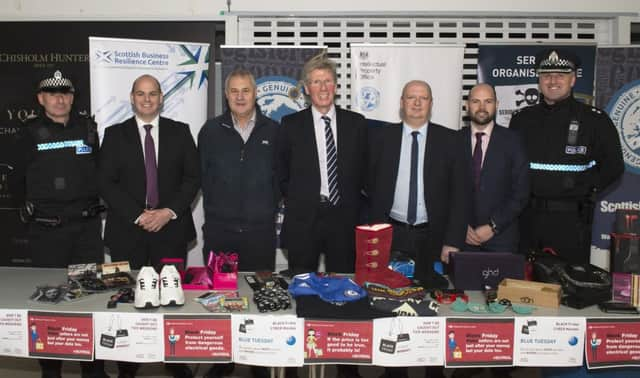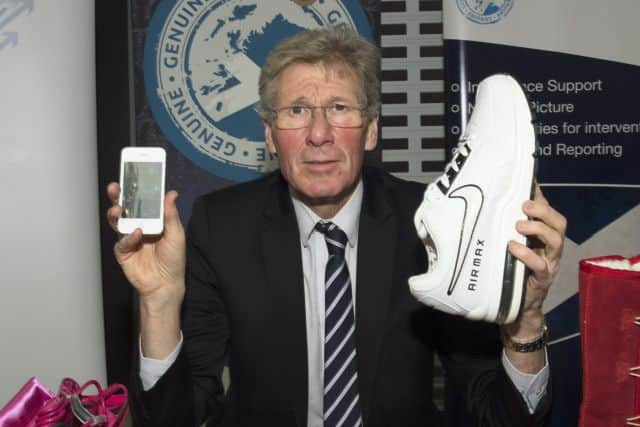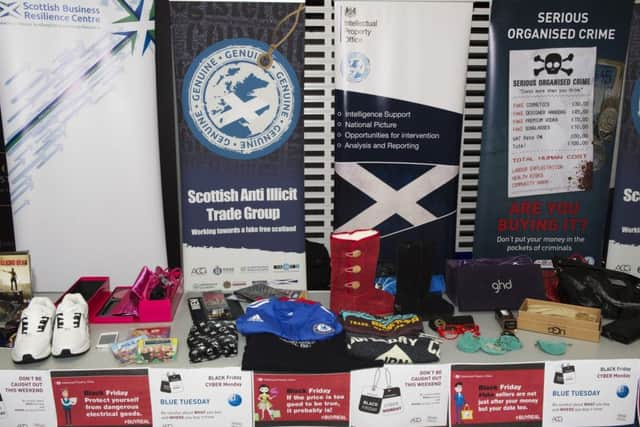Do you know where your Christmas presents are coming from in 2017?


If these ‘bargain buys’ were offered would you snap them up? If we’re honest, the majority of us would.
But what if you knew that by purchasing these goods your hard-earned cash was going to criminal gangs involved in the drug trade or even to fund terrorism – would that change your mind?
Advertisement
Hide AdAdvertisement
Hide AdAnd what if you were told that the sportswear or toys you buy for your children were made by youngsters, perhaps even the same age, who had their legs broken to make them stay at a machine and complete the work – would that change your mind?


Or if you learn the make-up you put on your face or the perfume you spray contains potentially harmful substances or even urine – would that change your mind?
The message about the dangers of such so-called ‘bargains’ is one that several agencies are working in partnership to deliver.
Last month, the Scottish Anti-Illicit Trade Group,and its chairman, former Justice Minister Kenny McAskill, along with representatives from Police Scotland and the Scottish Business Resilience Centre, were in Falkirk’s Howgate Shopping Centre to highlight the problem of illicit and counterfeit goods to the public.
Advertisement
Hide AdAdvertisement
Hide AdOne of those present was DC Andy Law who said their priority had been to educate shoppers into the impact of buying such items.


He said: “Latest figures show that five per cent of goods imported into the EU are illicit. The problem is people often think they are buying a genuine product but it’s not, it just looks like it is. It can be anything from washing up liquid to what looks like Lego but isn’t.
“However, it can also be products such as pesticides which a farmer could buy thinking it was genuine and use it on his land with serious repercussions.
“We urge people to use due diligence whenever they are buying anything, particularly if it is from a source that they don’t know.”
Advertisement
Hide AdAdvertisement
Hide AdThe growth of Internet shopping has given those involved in illicit trade an almost perfect platform to distribute their goods and bring in cash.


But by adopting a few rules for savvy shopping, people can be safe and not either risk harm to themselves or help fund the criminals.
DC Law said: “We ask people to follow the three ‘Rs’ – recognise fake goods, reject them and report it.
“The best way they can do this is by being aware of the four ‘Ps’. Is the price too good to be true? The place that you’re buying from, is it a trusted site? The packaging – watch out for spelling errors, and be aware of the products themselves.
Advertisement
Hide AdAdvertisement
Hide Ad“By following these few simple steps it can keep people safe.”


He added that one of the easiest ways to spot whether or not an Internet site is genuine is by looking at the ‘contact us’ page. If it doesn’t list an address but instead only has a place where you can leave your details it is unlikely to be a reputable company.
Likewise if its privacy and policy page has spelling or grammatical errors, it’s likely to have been written in another language and translated.
DC Andy Nisbet, who works alongside DC Law at the Scottish Crime Campus in Gartcosh, said: “People should ask themselves if they would give their personal information and bank details to someone they met in the street because that is what they are effectively doing with these websites. These details can then be used to create other websites to sell illicit goods.”
Advertisement
Hide AdAdvertisement
Hide AdHis colleague added: “We are working with businesses too so that they can understand how these illicit goods can find their way into the supply chain.
“The Internet has created a global marketplace but everyone needs to be aware of what they are buying. If they buy from those involved in criminality it has an effect on genuine businesses who won’t have the money available for research and development which could have a far-reaching impact on Scotland’s future economy.”
The battle against counterfeiters isn’t one which the Scottish partners, who include Border Force, HMRC, Scottish Fire and Rescue Service, Trading Standards and Food Standards Scotland, are fighting alone. They are working with similar organisations across Europe to tackle the growing problem.
However, the Scottish partnership model is one that is recognised as being highly effective.
Advertisement
Hide AdAdvertisement
Hide AdA report published earlier this year by Europol – the European law enforcement agency – and the European Union Intellectual Property Office, highlighted the importance of tackling counterfeiting and piracy in the EU.
It noted that such crimes are “an important source of income for organised criminal groups”, continuing: “These groups are also often engaged in other crimes, such as drug trafficking, excise fraud, human trafficking or money laundering. Their activities are increasingly facilitated by the use of corruption and document fraud.”
The report confirmed the counterfeiting and piracy in the EU is “a continuing challenge, with organised criminal groups often ‘pulling the strings’ and benefiting financially”.